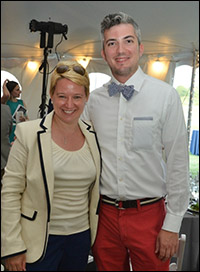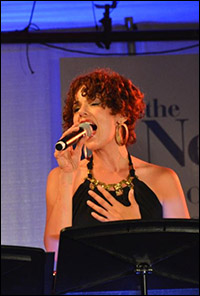
Whiteway is a perfectionist. The 32-year-old is a great represtentaion of the young energy that buzzes throughout the campus. He oversees the theatre center throught the year and is currently at the helm of the summer season.
Whiteway can be seen around the grounds in his red trousers and O'Neill baseball hat, managing and moving along the major national conferences that the O'Neill hosts. Under his leadership, the Eugene O'Neill Theater Center was awarded the 2010 Regional Theater Tony Award and has recently been awarded a grant of $3 million by the state of Connecticut to open a National Music Theater Institute for undergraduates.
With the O'Neill celebrating its 50th anniversary in 2014, Whiteway sat down with Playbill.com to discuss Jake Shears, the beginings of In The Heights and the fact that Robert Redford was inspired by the O'Neill to start the Sundance Institute.
Question: How did you end up at the O'Neill?
Preston Whiteway: It's all thanks to a man named Emanuel "Manny" Azenberg. He produced all of Neil Simon's work on Broadway. He would fly down once a week to teach a course at Duke. He took a lot of time out of his schedule to come teach down there. It was the most amazing class I ever took there. He would take each one of us out to dinner or breakfast while he was there and listen to our dreams. He learned that I wanted to be in arts management or producing or something. Every week he would give the class three plays to read and he would take the cover page off and we would have to read it without forming prejudgments about the play. We had to just dive in.
One of the responses I got from him midway through the course was that he wrote a name and number and it was here at the O'Neill. He had heard that they were looking for a general manager and he had recommended me. The O'Neill at that time certainly could not afford a real person, I mean an experienced person. The only reason they took me on was that they could only afford a kid.
Question: You were only 22! What was that like? You are the one who gives the orientation speech to everyone who comes to the O'Neill. What was your first time here like?
Whiteway: It was like being shot out of a cannon. I got here a week before the Puppetry Conference started and immediately the summer schedule started and we were not prepared. None of us had seen a summer before. The O'Neill was in tough fiscal shape, but we found a way to muddle through. The artistic director had resigned one day before the Playwrights Conference. It was tough going there. There were a lot of logistical challenges.
Question: Had you ever encountered puppets before like that?
Whiteway: No, it was wild; it was like drinking from a fire hose. You just had to hold on as the onslaught of the summer was upon us. The work, though, was great! That was the first that we had ever combined the Playwrights and Music Theatre Conferences on top of each other, so none of us had ever been through the summer. There was artistry happening all over the campus. We found that it was such a positive experience. I likened it to a Balkan state. Each program was separate and enclosed and sidled away from each other. It has been a big effort of mine and the boards to have the conferences to interact.
Question: I was watching your 2010 Tony acceptance speech. Who has served as your mentors at the O'Neill?
Whiteway: When I first got here I had never fundraised and the woman in the executive director position was Amy Sullivan. [Sullivan], Tom Viertel and Manny, those are my three principal mentors. It was a surreal six weeks when the Tony was announced.
Question: Where were you when the Tony was announced?
Whiteway: I was, of all places, sitting in a pew in church and I got a text message. All I wanted to do was scream.
 |
||
| Wendy C. Goldberg and Preston Whiteway |
As you know, the Regional Theatre Award is recomended to the Tony Award committee by the [American] Theatre Critics Association (ATCA), and the O'Neill having started both the National Critics Institute and ATCA having begun at the O'Neill, there was a wonderful full circle. We were the first developmental theatre to be recognized that way.
Question: Do you have an specific memories of that night?
Whiteway: It was like carrying the golden ticket around from "Charlie and the Chocolate Factory." Everybody was so wonderful. What moved me the most was how many artists came up to say what the O'Neill meant to them. They have such fond memories of their time here.
Even though you're sleeping in a dorm and there is a cafeteria line, there is something magical about this place and I've found it reminds artists why they got into theatre in the first place. When the O'Neill's name was called out that night, the cheer that went up was one of the loudest of the night. It was very humbling. Question: That sounds fantastic. There is so much exciting stuff happening. You have received a $3 million grant from the state of Connecticut.
Whiteway: Yes, that's part of the a larger campaign to start an undergraduate program in music theatre training.
Question: What do you see in the future for the conferences?
Whiteway: What's wonderful about the inherent mission of this place, the fact that we are constantly, just because of our very nature, on the cutting edge of new theatre, new artistry. For whichever program, it is in our DNA to push the art form forward. In many ways our audience is not just the local community that is coming to see our work, but we are serving the American theatre by launching and bringing new plays to the canon to be performed all over the country and the world.
 |
||
| In the Heights' Janet Dacal performs at the recent gala |
Question: The O'Neill is this exceptional place where so much interesting new stuff is continuously being created. You were here when In The Heights was being workshopped. What was that like?
Whiteway: The energy in the barn when In The Heights was here was palpable. No one could predict the future about whether it was or was not going to be on Broadway but there was no question that this was a special piece. The energy was electric. The cast would have salsa dance parties every night after work and it was drawing a lot of attention out of New York, as many of our pieces do.
Question: The Tony Awards Administration Committee announced June 13 that starting with the 2013-14 theatrical season, New York-based theatre companies will be eligible to receive the Regional Theatre Award. Do you think is a problem for the future of regional theatres outside New York?
Whiteway: Regional theatre is very strong. Most of the exciting work in this country is being done by the nonprofit theatre community. The O'Neill was founded to address the lack of new American plays in New York on and Off-Broadway. In a way we are still fighting that battle. It is still tough to get a new American play on Broadway, but it is definitely easier now than it was in 1964. The Tony eligibly being broadened to include New York theatres is a tough call. I understand a part of it. There are a lot of wonderful New York non-profit companies that are not elegible for a Tony I wish there was some solution to find a way around this: Whether a special Tony award offered infrequently but often enough to recognise talent and prestige.
As a regional theatre out of New York, I totally understand why most regional theatres feel that it is a bit of a slap in the face.
Question: Do you feel that "it is a bit of a slap in the face"?
Whiteway: It's special to have the recognition of a Tony award go to an organization outside of New York.
Question: The O'Neill's 50th anniversary is coming up. Jeffery Sweet, who is working on the anniversary book, said there are some interesting stories about the history of the O'Neill.
Whiteway: We are documenting in a couple of major ways [how] the O'Neill has transformed and changed the face of American theatre. One of these efforts is a book that will be published by Yale University Press that will document that story. We've been speaking with a number of alumni and we were speaking with Robert Redford who came here in the early 80s to study what we do, because he wanted to bring the O'Neill model to film and to create a place that was a retreat setting for screenwriters to work on their pieces. Of course that succeeded brilliantly and exploded into being the Sundance Festival.
Sundance Theatre Lab is our closest organization that has the most similar mission as the O'Neill, except they don't do audiences. What was really humbling was that he based it all on the O'Neill.
Question: When is the book going to be published?
Whiteway: It comes out on May 2014. The other exciting element is that the New York Public Library of the Performing Arts will be doing an exhibition and will visually tell the story of the O'Neill, also in May 2014.
Question: Have you ever been tempted to bring in big name actors to promote the public readings at the O'Neill? Whiteway: We are not the National Actors Conference, we are the National Playwrights Conference, and we are constantly focused on the script. We are focused on making the work central and make it the best it can be. So at the next step, when the production manager brings in costume and lights, the script is the best it can be.
Question: What are your favorite moments at the O'Neill?
Whiteway: Generally a favorite moment is watching a playwright watch his or her work go up for the first time. The look of joy and terror on their face reminds me why we're doing what we're doing. I also love when work is born here that we had nothing to do with. Over a late-night drink together, people meet at the O'Neill and go create something completely new and different.
What can better than when Jake Shears is at the O'Neill? When he was the composer for Tales of The City, he DJ-ed a party at the pub.
Question: What's next for the O'Neiil?
Whiteway: The launch for our new undergraduate theatre for music theatre will transform the O'Neill because of the new buildings on campus. Also we will be launching new composers, new actors, new choreographers with this program. It is an exciting time. The work has never been better.
Question: Do you see yourself sticking around?
Whiteway: I love this place. I might not be on the 40-year plan that George White was on, but I look forward to the future and what's wonderful about this place is that it is constantly reinventing itself. I look forward to constantly reinventing myself.










